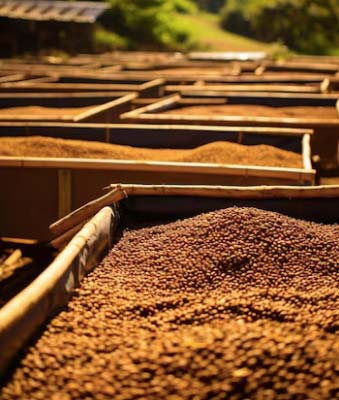In every cup of coffee, there’s a deeper story that goes beyond its stimulating taste and comforting aroma. This story is about sustainability – a concept gaining traction among coffee enthusiasts worldwide. Sustainable coffee isn’t just about enjoying a high-quality brew; it’s about understanding the impact of coffee production on our planet, communities, and health. As we increasingly gravitate towards sustainable coffee options, we contribute to a movement that promises more than just a delicious beverage – it offers a path towards a more responsible and conscientious global coffee culture.
Choosing sustainable coffee means engaging with practices that protect the environment, support equitable labor practices, contribute to economic stability, and offer personal health benefits. This blog aims to shed light on these multifaceted advantages, emphasizing why the shift towards sustainable coffee is not just a trend but a meaningful choice for coffee lovers everywhere.
Environmental Benefits

Choosing sustainable coffee is a silent pledge to Mother Nature, a commitment to reduce our carbon footprint and champion biodiversity. Sustainable coffee farming practices are designed with the earth in mind, limiting the use of harmful chemicals, conserving water through innovative irrigation techniques, and preserving natural habitats. This approach ensures the ecosystem’s health and protects the species that call these coffee farms home.
Read more: What’s the Difference between Medium Roast Coffee & Medium Dark Roast Coffee?
Reducing Greenhouse Gas Emissions
Sustainable coffee farming employs techniques that help mitigate greenhouse gas emissions. By minimizing the use of synthetic fertilizers and pesticides, which are significant contributors to climate change, sustainable coffee production helps curb the release of harmful gases into the atmosphere. Additionally, many sustainable coffee farms incorporate agroforestry practices, where coffee plants are grown alongside other trees and vegetation. This integrated approach not only enhances soil health and biodiversity but also increases the farms’ carbon sequestration capacity, effectively removing atmospheric carbon and storing it in the plant biomass and soil.
Preserving Biodiversity
Sustainable coffee farming prioritizes the preservation of natural habitats and the protection of local flora and fauna. Unlike conventional monoculture plantations, sustainable coffee farms maintain a diverse ecosystem, providing a safe haven for numerous species of birds, insects, and other wildlife. This biodiversity is essential for the long-term health and resilience of the coffee-growing regions, as it supports pollination, pest control, and the overall ecological balance.
Water Conservation
Water is a precious resource, and sustainable coffee farming recognizes the importance of responsible water management. Sustainable practices, such as the use of drip irrigation systems and the implementation of water-efficient processing methods, help minimize the amount of water required for coffee cultivation and processing. This approach not only reduces the strain on local water resources but also ensures that the surrounding communities have access to clean and adequate water supplies.
Soil Health Maintenance
Sustainable coffee farming emphasizes the importance of maintaining soil health through the use of organic fertilizers, cover cropping, and other regenerative techniques. By avoiding the use of synthetic chemicals, these practices preserve the soil’s natural nutrient balance, enhance its water-holding capacity, and promote the growth of beneficial microorganisms. A healthy, fertile soil is the foundation for long-term coffee production, safeguarding the future of this beloved beverage.
Social Benefits

The journey of sustainable coffee does not end with environmental preservation; it extends its warm embrace to the very hands that nurture the coffee beans to life. Fair labor practices and community development are at the heart of sustainable coffee initiatives.
Fair Compensation for Coffee Farmers
By ensuring fair compensation, sustainable coffee programs acknowledge the hard work of farmers and invest in their dignity and rights. Sustainable coffee brands often engage in direct trade partnerships with coffee growers, eliminating intermediaries and ensuring that a larger portion of the retail price reaches the farmers. This equitable distribution of benefits empowers coffee producers, allowing them to improve their livelihoods, invest in their families, and cultivate a sense of pride in their work.
Empowering Coffee Farming Communities
Sustainable coffee programs often incorporate educational and healthcare initiatives, uplifting entire communities. These programs may provide access to formal training, financial literacy workshops, and agricultural extension services, equipping coffee farmers with the knowledge and resources to improve their farming practices and overall well-being.
Promoting Gender Equality
Many sustainable coffee initiatives actively promote gender equality and women’s empowerment in the coffee supply chain. By supporting the participation and leadership of women in coffee farming, processing, and decision-making, these programs help break down traditional gender barriers and create more inclusive and equitable opportunities. This, in turn, strengthens the social fabric of coffee-growing communities and contributes to the overall resilience and sustainability of the industry.
Coffee drinkers supporting these initiatives are part of a larger movement towards social equity and empowerment, bridging gaps and building a future where every member of the coffee production chain is valued and supported.
Economic Benefits
Sustainable coffee offers a beacon of economic stability for farmers and their communities. By adopting practices that ensure long-term soil health and crop productivity, sustainable coffee farming looks beyond the immediate to secure a future where coffee can continue to flourish despite changing environmental conditions.
Increased Crop Resilience
Sustainable coffee farming techniques, such as the use of organic fertilizers, intercropping, and shade-grown systems, help improve the resilience of coffee crops to pests, diseases, and climate variability. This approach reduces the risk of crop failure and ensures a more reliable and consistent supply of coffee, providing farmers with a stable source of income over the long term.
Market Access and Premium Pricing
Sustainable Coffee production often engage in direct trade partnerships with farmers, allowing them to bypass intermediaries and receive a higher price for their beans. This premium pricing recognizes the quality and sustainability of the coffee, as well as the hard work and dedication of the farmers.
Community Development and Investment
Sustainable coffee initiatives often reinvest a portion of their profits into community development projects, such as infrastructure improvements, healthcare initiatives, and educational programs. This investment in the local community not only supports the well-being of coffee farmers and their families but also contributes to the overall economic stability and resilience of the region.
For coffee drinkers, choosing sustainable brands means contributing to a market that values the well-being of its producers. It’s an investment in a system that aims to distribute benefits more equitably, ensuring that the love for coffee can sustain those who enjoy it and those who grow it.
Health Benefits for Coffee Lovers
Beyond the global benefits, the choice of sustainable coffee brings a bouquet of personal health advantages to the table.
Reduced Exposure to Harmful Chemicals
Organically grown, sustainable coffee minimizes exposure to pesticides and chemicals, offering a cleaner, purer coffee experience. This cultivation method preserves the coffee’s natural antioxidants, contributing to the health and wellness of coffee drinkers. By avoiding the ingestion of synthetic chemicals, sustainable coffee lovers can enjoy a safer and more wholesome coffee experience.
Antioxidant-Rich Coffee
Sustainable coffee farming practices, such as shade-grown cultivation and organic fertilization, help preserve the natural antioxidants present in coffee beans. These antioxidants, including polyphenols and chlorogenic acids, have been linked to various health benefits, such as reduced inflammation, improved cardiovascular health, and even potential protection against certain types of cancer.
Psychological Well-being
Choosing sustainable coffee also brings a sense of psychological well-being. Knowing that your coffee choice supports ethical practices and contributes to positive change can enhance the coffee-drinking experience, adding a flavor of goodwill and satisfaction that no ordinary cup of coffee can provide. This heightened sense of purpose and social responsibility can have a positive impact on an individual’s overall well-being and happiness.
How to Support Sustainable Coffee
Supporting sustainable coffee involves making mindful choices that extend from the brand of coffee you buy to the accessories and brewing methods you use. Embracing sustainability as a coffee drinker means considering not just your coffee’s origin and production practices but also how you prepare and enjoy it daily.
Select Sustainable Brands
The cornerstone of supporting sustainable coffee lies in choosing brands that prioritize ethical and eco-friendly practices. Look for a company that is transparent about its sourcing, engages in direct trade practices, and invests in communities where its coffee is grown. These brands often provide detailed information about their sustainability initiatives, enabling you to make an informed decision.
Use Eco-Friendly Brewing Methods
Beyond the coffee itself, how you brew and consume your coffee plays a significant role in your environmental footprint. Opt for compostable OneCUP™ pods if you enjoy the convenience and consistency of single-serve machines. These pods break down in a commercial composting facility within weeks, returning rich nutrients to the soil.
Reduce Waste and Recycle
Minimizing waste is another essential aspect of supporting sustainable coffee. Opt for whole bean or ground coffee packaged in recyclable or compostable materials, and properly dispose of any used coffee grounds or filters. Many sustainable coffee brands even offer recycling programs for their packaging, making it easier for you to reduce your environmental impact.
Educate Yourself and Others
Staying informed about the sustainable coffee movement and sharing your knowledge with others is a powerful way to drive positive change. Engage with your local coffee roasters, attend coffee-related events, and explore educational resources to deepen your understanding of sustainable coffee practices. By spreading awareness, you can inspire others to make more mindful choices and contribute to the growing momentum of the sustainable coffee revolution.
So, next time you’re about to enjoy a cup of coffee, remember that with every sip, you have the power to contribute to a more sustainable, just, and healthy world. The choice of coffee can be a simple daily routine or a profound act of environmental and social responsibility – it’s all about how you brew it.
Conclusion
The benefits of choosing sustainable coffee extend far beyond the boundaries of a single cup. Each choice we make as coffee drinkers has the potential to shape the future of the coffee industry and the world we live in. By embracing sustainable coffee, we become active participants in a global movement that prioritizes environmental stewardship, social equity, and economic stability.

I’m Kara Chavez, and I love coffee. I like to create some of the best coffees around – espressos, lattes, macchiatos . I strive for perfection in my coffee-making skills, and I take great pride in providing a delicious cup of joe to my customers.
I’ve been working in the coffee industry for years now, and I know everything there is to know about making a perfect cup of coffee. My passion for coffee shines through in every cup that I make, and I hope that you’ll stop by soon so that I can share my love of coffee with you!

